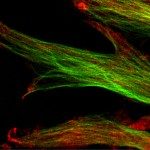Lien vers Pubmed [PMID] – 18005683
Cell Host Microbe 2007 Mar;1(1):77-83
Many bacteria pathogenic for plants or animals, including Shigella spp., which is responsible for shigellosis in humans, use a type III secretion apparatus to inject effector proteins into host cells. Effectors alter cell signaling and host responses induced upon infection; however, their precise biochemical activities have been elucidated in very few cases. Utilizing Saccharomyces cerevisiae as a surrogate host, we show that the Shigella effector IpaH9.8 interrupts pheromone response signaling by promoting the proteasome-dependent destruction of the MAPKK Ste7. In vitro, IpaH9.8 displayed ubiquitin ligase activity toward ubiquitin and Ste7. Replacement of a Cys residue that is invariant among IpaH homologs of plant and animal pathogens abolished the ubiquitin ligase activity of IpaH9.8. We also present evidence that the IpaH homolog SspH1 from Salmonella enterica can ubiquitinate ubiquitin and PKN1, a previously identified SspH1 interaction partner. This study assigns a function for IpaH family members as E3 ubiquitin ligases.




